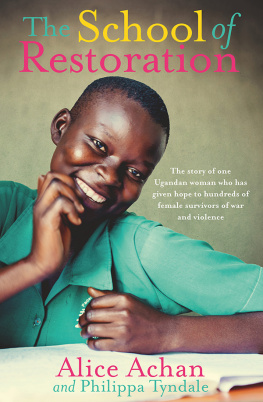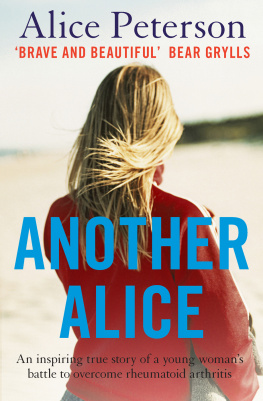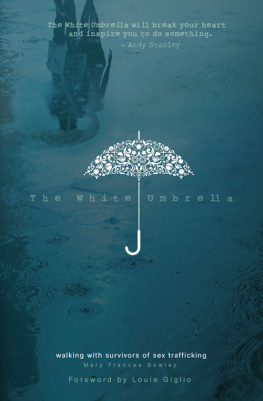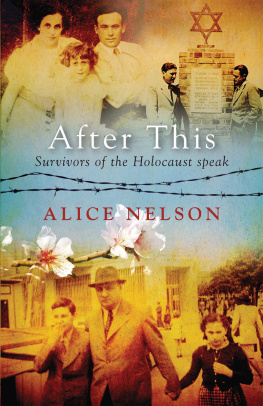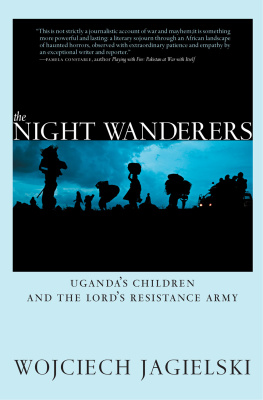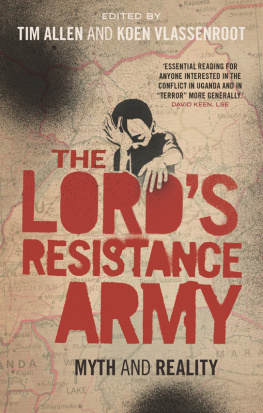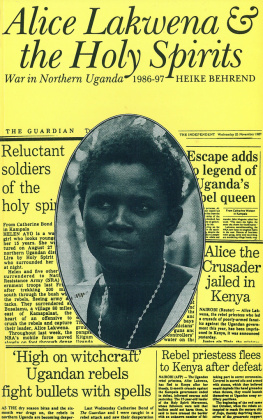Our elderly father, my Baba, stood his ground the day the Karimojong came in December 1986, with their spears and rifles. He was not a man to run, to leave his family, so he planted himself at the entrance to his hut in the village of Alebtong, waiting to confront our attackers. Make sure the mothers and children are safe, he told my brother Charles. I will not run and give up everything Ive worked for in my whole life. That was when Charles came to our huts, hitting their sides with a stick to wake us.
The Karimojong arrived, whooping their fierce war cries, but we had all fledall of us except for Baba who, at close to 80 years old, stood staring down a Karimojong so fiercely that his muscles twitched uncontrollably. You can kill me, but you wont take my cattle, my father said, pushing away the fear in his voice. They shoved him to the ground and beat him with their rifle butts, then left him lying there, not caring if he lived or died.
After this December day during oro, the equatorial dry season, the days and months blurred into one long ordeal of daily attacks and heart-thumping fear.
The first time I fled the attackers, I was thirteen years old. I found myself huddled behind a huge ant hill, shaking at the thought of being caught. I had never before known what it was like to be frightened by man.
That day, Id woken before dawn, listening for the mego, my four mothers who would be up early to set the fire, grind the millet and stir the porridge we call nyuka. I so loved the quiet hours of summer mornings before the village awoke, when I could doze in and out of my dreams. I still relied on the mothers to prepare my meals.
From the moment my eyes opened, this day felt different. I felt a crippling heaviness on the village, a weight like a net falling, trapping me. Yesterday, the sky had been bright and blue, and now as I peered through the opening to my hut I saw dull grey clouds hovering low. My heart jumped at the crack of a gunshot from the direction of the kraal, where we kept our cows.
Ugghh, I heard soon afterwards, and I sat up to listen. There was more gunfire, closer this time.
Aieee, came a sharper scream just outside the compound. It was time to move, to gather my nieces and cousins who shared my hut. I shivered at the silence as I stepped out of the small entrance. I looked up to the trees, the shea and acacia, but a hush had come over the birds, and even the roosters did not crow. Then I saw my older brother, Charles, standing in the middle of the compound. Whats happening? I called.
Its the Karimojong, theyve taken our cattle, Charles said, his chest heaving after running from the kraal. He was fifteen years old, and already tall and strong, with the build of an athlete. They are stealing and burning. Run, or they will kill you. His eyes looked wild, and he swept his arms up to shoo us away. I stood my ground, wanting to hear more.
I heard them outside, and I told the other boys, Wake up, wake up, they are here for our cows, Charles said, still panting. We ran to the kraal and tried to free our cows, but they surrounded us. I had now heard enough and, as the gunshots were moving closer, we had no time to plan an escape. I grabbed the hand of my niece, Jacklyn, and scooped up my crying nephew, Bazillo, who stood naked and rooted to the dirt nearby. I propped him onto my hip, wrapped my spare arm around him, and sprinted into the tall grass at the back of our compound. The dead weight of a two-year-old soon slowed me, and the sharp stubble of cut grass and loose rocks stabbed at the soles of my feet until they bled. I bit on my lip to avoid crying with pain.
I had stopped at the edge of the grass to look back as Charles ran from hut to hut to warn other family members. Please run, Charles, I had whispered. Or you will surely die. I could not stand the thought. I was so proud to see Charles, the closest to me in age, grow into a strong leader like our Baba, Otto Zedekiah, who was a respected county chief, now long retired.
Run! my mother screamed, and I saw her herding other children with her arms to hurry them along before she, too, fled in the opposite direction to the shots. Within minutes the entire familyexcept Babahad scattered into the surrounding bush.
The Karimojong. The very word made my chest tighten and my palms bead with sweat. They were our neighbours, but they were not our friends. These cattle stealers came from the region to the east of Acholiland, a place more barren and impoverished than our Pader district. Karamoja was drier, more isolated and less populated than our Acholiland. To young girls, the Karimojong were a mystery. Once, in the township of Lira, my cousin Mary had seen a warrior striding along the street with a spear in his hand, with nothing to cover his nakedness but a brightly coloured cloth draped across his shoulder and hanging down by his side. They had not changed in centuries. Whereas we, the Acholi people, had adopted many British customs and had long worn Western clothes: traditional tops, skirts, trousers and dresses.
Do not stand between the Karimojong and a cow, Mary had told us, with great authority. They think all cattle in the world belongs to them, and they will shoot you with their guns. She then added, And if a boy wants a girl as his wife, he will take her for himself, so no one else will have her.
Eww, was all I could answer, as I shuddered with disgust. In my Lwo language, the act of rape was known as nywaro: taking what is not yours.
Once before, when I was much smaller and lived in Lapilyet, Karimojong raiders had come to the village with spears, bows and arrows, to steal our cattle at night while we slept. I had been too young to remember it, but these stories had found their way into our family legend. This time the Karimojong had come armed with guns (which they had stolen from government forces in a border skirmish) and it terrified me to think about what they might do.
Soon the other girls were well ahead of us as I plodded along with the two little ones. I knew this landscape well, from the flat, cleared pasture where cattle and goats grazed, to the brush that dried to gold in the summer season and was then burned off to coax out the anyeri, edible rats, and the little antelope, apoli. Beyond that was the grassy undergrowth, and then the stream, the Omot, where the grass was tall and thick, and the tops of the papyrus reeds spread out as a canopy. Here I knew we could find shelter. By now the gunfire and shouts had faded, and my breathing had slowed enough to talk.
I found an ant hill that was taller than a warrior; it was so large that anyone approaching the hill could not see us behind it. It was under a thorn tree, surrounded by thick blackberry bushes, and ideal for protection. We made our way under the bushes, carefully folding back the grass so our enemy would not notice footmarks.
Are you okay, Jacklyn? I asked. The little girl had not said a word as we ran, though she had deep slashes across her calves and her hair was matted and dishevelled.
When will I see my Mama? she asked me, her eyes welling with tears.
I cant say, but we will make it back, I reassured her. She looked at me and nodded, retreating into her silence. My instinct for survival told me to run fast and alone, but I could not abandon these little ones.
The sun had still not appeared. The sky was dusty, and it was cool under the tree. I saw holes in the ground, where I imagined snakes coiled up in their own dark hiding place, maybe even as scared as we were. I thought of other dangersthose that occupied me when I played in the grass around the villagesuch as pythons or scorpions or stinging red ants, which could fight back against small grass snakes. We curled up in a ball of naked legs and arms, unaware of time. I could barely imagine what would happen if the attackers found us. Would they torch the grass, and force us out like fugitive animals? I gathered Bazillo and Jacklyn closer.

